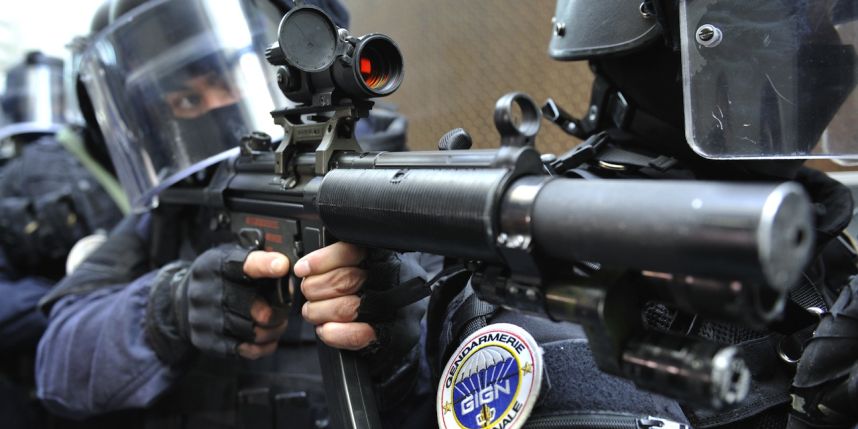(Editor’s note: Turkish President Tayyip Erdogan has stated Turkish intelligence apprehended a suspected terrorist – believed to be Ibrahim El Bakraoui – in July 2015 near the Syrian border, then deported him. Though Turkish official notified Belgian authorities they suspected El Bakraoui was an Islamic militant, Belgian officials stated the man had a criminal record, but no history related to terrorism. Belgian authorities released him. A second Turkish official said El Bakraoui was apprehended a second time one month later and again deported.)
As an expat, I think a lot about where my family will be safe, and, by extension, which countries have effective intel services and counter-terrorism capability.
In 2016, it’s difficult to say with any authority which countries are most likely to stop Islamic State attacks because the global intelligence matrix is more fractured than it’s ever been. And after all, they’re secret. But the trend has been for intelligence agencies to stand up their own counter-terrorism paramilitary units as well as specialized, short-term counter-terrorism operations kept compartmentalized even from others in the same agency.
All Americans know about the daring-do of SEAL Team Six and Delta, but few have ever heard of GreyFox or the other operational names of the Intelligence Support Activity, for example. Even Mossad, which we think of as Israel’s CIA, is basically a bureau for a quilt work of agencies including Aman and Shin Bet, and super-secret operational groups such as Nitro Zeus. The Israelis are good … very good. But no modern country can reduce the terror threat to zero, because terrorists use the freedoms of our open societies to cloak their activities and to recruit.
 Case in point: On Wednesday, Belgian French-language news agency RTBF broke the news that the El Bakraoui brothers – Khalid and Ibrahim – were the two suicide bombers in yesterday’s attack at Zaventem Airport and at the Maelbeek subway. According to BBC sources, the brothers were known to security officials, but as with the Paris bombers, they were on police radar as ordinary, if notably violent, criminals … until they got religion and joined Islamic State.
Case in point: On Wednesday, Belgian French-language news agency RTBF broke the news that the El Bakraoui brothers – Khalid and Ibrahim – were the two suicide bombers in yesterday’s attack at Zaventem Airport and at the Maelbeek subway. According to BBC sources, the brothers were known to security officials, but as with the Paris bombers, they were on police radar as ordinary, if notably violent, criminals … until they got religion and joined Islamic State.
And in defense of Belgian and French security officers, the ISIS operations in France and Belgium appear to be organized around a relatively small network of brothers and friends supplied by logistics intermediaries from ISIS, and perhaps one specialized bomb maker.
The Wall Street Journal and the BBC are reporting the Brussels attacks link directly to the same IS members who organized and executed the Paris attacks. The central figures are Abdelhamid Abaaoud and Salah Abdeslam. The French GIGN and Belgian counter-terrorism forces apparently were hot on Abaaoud’s trail during the January 2015 siege in Verviers, Belgium, but missed several opportunities to track him down.
Later, he would brag in the ISIS magazine Dabiq about going back and forth between Syria under the noses of European intelligence agencies.
Abdeslam is now in custody, and Abaaoud was killed in St. Denis shootout just after the Paris attacks.
Since the 13 November attacks in Paris, Morrocco’s intelligence agency, the CBIJ has been key to providing French and Belgian intelligence operatives and case officers have had fighting ISIS. So, think about the soul-searching going on now in Paris and Brussels.
To their defense, I’ve had peeks behind the curtain, and it’s generally not pretty. If it’s not internal rivalries, turf fights and multiple chains of command hamstringing officers’ efforts, it’s the refusal of countries that are nominal allies to share critical intel. Having worked in Belgium in the 1980s, I know it’s really two countries – French and Flemish. Two cultures that detest each other, so you can imagine how that’s playing out bureaucratically behind the scenes.
All that means Belgium is inherently a soft target, and IS terrorists, who are homegrown, can’t resist a soft target.
So, who does the best job of ratting out the Bad Guys, and keeping its citizens safe? And to be clear, we’re talking about counter-terrorism, generally a small but crucial part of a country’s overall intelligence gathering effort. Further, though countries such as Spain have large immigrant communities from the Middle East, their counter-terrorism efforts have mostly been focused on indigenous threats such as Basque groups.
Here are our ratings:
 • Britain has the fabled MI6 foreign security service. I’ve met a lot of intelligence officers in the Balkans, Iraq and Afghanistan, but never anyone whom I was aware was working for MI6 – their CIA – so I give them bonus points for inscrutability. The U.K. also has the domestic security agency MI5, their FBI and who know how many other species of super-secret squirrels.
• Britain has the fabled MI6 foreign security service. I’ve met a lot of intelligence officers in the Balkans, Iraq and Afghanistan, but never anyone whom I was aware was working for MI6 – their CIA – so I give them bonus points for inscrutability. The U.K. also has the domestic security agency MI5, their FBI and who know how many other species of super-secret squirrels.
From conversations with American intelligence operatives, it’s clear Britain has done a superior job of integrating human intelligence (running agents) and electronic surveillance with GCHQ, the British version of the NSA. Those contacts also tell me the Brits are diligent about recruiting and promoting talented people of Asian, African and Middle Eastern descent as intelligence officers, especially in counter-terrorism. Both MI5 and MI6 use their websites as tools for aggressive talent recruitment! The result: No major attacks on British soil since the 2005 London bombings. All that said, British intelligence has not been hesitant to tell the public lately that the threat level is high and rising.
INTERNATIONAL TERRORISM
The UK faces a serious and challenging threat from international terrorism. The UK threat level for international terrorism is currently at SEVERE, meaning an attack is highly likely.
The majority of terrorist attack plots in this country have been planned by British residents. There are several thousand individuals in the UK who support violent extremism or are engaged in Islamist extremist activity. British nationals who have fought for extremist groups overseas continue to return to the UK, increasing the risk of terrorist attacks. Using skills acquired overseas, they may organise attacks under direction from outside the UK, or on their own initiative, or they might radicalise others to do so. While the majority of returners will not mount attacks in the UK, the large numbers involved mean it is likely that at least some of them will attempt to do so.
And even as good as the Brits and Germans are, several “lone wolf” attacks in Great Britain and Germany have been foiled by the thinnest of margins, according to media reports.
Rating 9 … until something bad happens.
• Morocco may not be in Europe, but it’s connected to Europe via its history as a French colony until 1955. A 2015 UN Human Rights Council report named Morocco’s CBJI as the most effective intelligence agency in the Middle East and North Africa, mainly due to its strong ties to intelligence agencies in the U.S. to China. That’s saying something. Let’s hope the Moroccans keep passing critical intel to their French and Belgian counterparts.
Rating: 8. So far, so good.
 • Turkey: Let me tell you a story. I was a reporter with European Stars and Stripes, working the border between Turkey and Iraq just before the Second Gulf War. I was with a former Turkish commando, and we were trying to figure out how to sneak into Northern Iraq to hook up with Kurdish Democratic Party officials in Zhako. My friend and I thought we were staying below the radar … until we were getting out of our van for lunch in the border town of Nusaybin and were surrounded by several carloads of Turkish gendarma, undercover police and MIT security officers. Oooops.
• Turkey: Let me tell you a story. I was a reporter with European Stars and Stripes, working the border between Turkey and Iraq just before the Second Gulf War. I was with a former Turkish commando, and we were trying to figure out how to sneak into Northern Iraq to hook up with Kurdish Democratic Party officials in Zhako. My friend and I thought we were staying below the radar … until we were getting out of our van for lunch in the border town of Nusaybin and were surrounded by several carloads of Turkish gendarma, undercover police and MIT security officers. Oooops.
My point is, Turkey’s MIT knows the ground game. But even they can’t stop individual attacks, as we’ve seen in Istanbul and Ankara over the past month. Discreet networks of terrorists are almost impossible to interdict. As good as the Turks are, the best I’ve seen are the Israelis. In 1999, the Turks were able to nab Kurdish leader Abdullah Ocalan after a war that cost 30,000 lives. Well, the Turks took credit. But friends in U.S. military intelligence later told me that in fact the Israelis tracked down Ocalan.
Rating: 8, but questions arise as to whether the government of Tayyip Erdogan has weakened MIT by substituting AK Party loyalists for professionals as it purged the Turkish military.
 • Germany has the feared GSG 9, whose operators are ranked with the Brit’s Special Air Service/Special Boat Service, Delta and SEALs. Media reports that true to the trend, Germany has a new counter-terror organization, BFE+, about which there is precious little in open-source documents. Is it a police force, or an intelligence agency? Who knows? But at least the Germans are expanding their capabilities.
• Germany has the feared GSG 9, whose operators are ranked with the Brit’s Special Air Service/Special Boat Service, Delta and SEALs. Media reports that true to the trend, Germany has a new counter-terror organization, BFE+, about which there is precious little in open-source documents. Is it a police force, or an intelligence agency? Who knows? But at least the Germans are expanding their capabilities.
Also, the Germans are renowned for not just cooperating with foreign intelligence agencies, but training with them. The Turkish newspaper Hurriyet reported today that a combined German-Turkish operation nabbed three suspected ISIS terrorists in Istanbul after an intel tip about a planned attack targeting German schools and embassies there. With zero significant attacks since the 1986 Disco Bombing, German intelligence’s overall batting average is 1.000.
Rating: 8, but only because as a Western European democracy, the Germans can’t unleash hell like authoritarian governments.
 • France, like the U.S., has an internal security force – DGSI – similar to the FBI, and the DGSE, the foreign intelligence agency restricted to operating outside France’s borders. Both were only formed in the 1980s after a consolidation of a crazy quilt of post-World War II intelligence entities following abuses including torture, summary executions and disappearances as part of the counter-insurgency tactics in Algeria during the Algerian War, and in Indochina. GlobalSecurity website ranks DGSE fifth in the world of metadata collection after the U.S., the UK, Israel and China and the No. 2 intelligence data collection and processing center in Europe after the UK.
• France, like the U.S., has an internal security force – DGSI – similar to the FBI, and the DGSE, the foreign intelligence agency restricted to operating outside France’s borders. Both were only formed in the 1980s after a consolidation of a crazy quilt of post-World War II intelligence entities following abuses including torture, summary executions and disappearances as part of the counter-insurgency tactics in Algeria during the Algerian War, and in Indochina. GlobalSecurity website ranks DGSE fifth in the world of metadata collection after the U.S., the UK, Israel and China and the No. 2 intelligence data collection and processing center in Europe after the UK.
The army has its own gee-whiz counter-terrorism operators, the GIGN, that works with the national police force. All that said, not only did French intelligence fail to stop the Nov. 13 terror attacks, it was unable to track down surviving members of that ISIS network without the help of Moroccan intelligence.
Rating: 4, but hope for improvement.
• Belgium’s Sûreté de l’État may rank as the worst in Europe. The problem is structural: Belgium is two countries. In the north, people speak Flemish, which is really Dutch, while in the south, the Walloons speak French. I remember being in Brussels in 1981 and stumbling into a full-blown, Molotov cocktail-tossing riot between French speakers and Flemish speakers. It was the worst ethnic (linguistic?) violence I would see until I deployed to Kosovo in 1999.
In a hugely prescient, but unnoticed, moment of candor, one of Belgium’s counter-terrorism operatives told Buzzfeed (yes, BuzzFeed) that his agency is overwhelmed:
“We just don’t have the people to watch anything else and, frankly, we don’t have the infrastructure to properly investigate or monitor hundreds of individuals suspected of terror links, as well as pursue the hundreds of open files and investigations we have,” the official, who spoke on condition of anonymity because he was not authorized to speak to the media, said. It’s literally an impossible situation and, honestly, it’s very grave.”
Belgian security officials have warned for years that they lack sufficient operating budgets and personnel, and Belgium’s bulky bureaucracy makes it difficult to share intel internally, much less with allies and other EU nations.
Rating zero. Expats … you might want to be selecting another country.
Co-CEO of Dispatches Europe. A former military reporter, I'm a serial expat who has lived in France, Turkey, Germany and the Netherlands.















